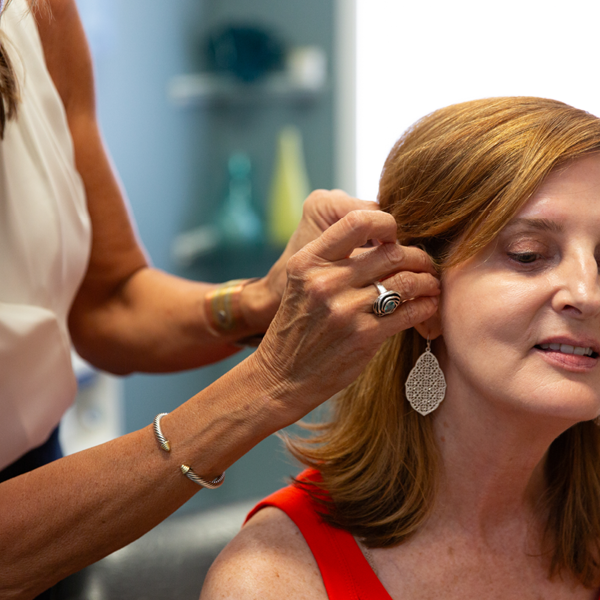This article was written by Kristin Johnston, B.A., BC-HIS, a HearingLoss.com®-Certified Provider located at Comprehensive Ear & Hearing in Grand Haven, Michigan.
Hearing plays a significant role in overall well-being. From communication and relationships to balance, mental wellness, bone and brain health, and more, it enhances daily experiences, supports independence, and contributes to overall quality of life.
As research continues to show effects of hearing loss beyond communication, the importance of prevention, regular checkups, and early intervention becomes more apparent. Here’s a look at links between hearing and whole-body wellness, including heart and bone health, vestibular function, emotional well-being, relationships, and cognition.

How Hearing and Heart Health Are Closely Linked
Hearing and heart health might seem like two separate systems, but they’re more connected than many think. Both ears and the heart rely on healthy blood flow for proper functioning and can be damaged by poor circulation. So it’s no wonder that hearing loss and cardiovascular disease (CVD) can go hand in hand.
One observational review of national health surveys in the U.S., for example, found that most of the respondents aged 70 and older who had heart failure were additionally experiencing hearing loss, per a Harvard news report on the investigation.
Exactly how heart issues and hearing loss are connected isn’t yet conclusive in all cases. CVD, however, may cause decreased hearing sensitivity by restricting blood flow to the structures of the inner ear, structures that rely on a consistent blood supply for oxygen and nourishment.
Many of the risk factors for cardiovascular disease are also risk factors for hearing loss. These include:
- Age: In the process of getting older, both cardiovascular health and hearing health may naturally decline.
- Tobacco use: Smoking can damage blood vessels, contributing to both poor heart health and potentially reducing healthy blood flow to the ear.
- Obesity: Obesity can lead to high blood pressure, diabetes, and other conditions associated with both hearing loss and CVD.
- Stress: Chronic stress can elevate blood pressure, which can harm cardiovascular and hearing health.
These connections make it all the more important to seek frequent hearing and cardiovascular screenings, especially if you’re at greater risk.

Take the First Step: Try Our Free Online Hearing Screener
Not sure if it’s time to see a provider? Our quick hearing screener can help you assess whether you’re experiencing signs of hearing loss — and what to do next. It only takes a few minutes.
Hearing’s Connection to Vestibular Health
The vestibular system is the part of the inner ear that helps control balance and spatial orientation. It works closely with your hearing system, helping you stay steady on your feet. As with heart health, your hearing and balance are closely linked.
Research associates hearing loss with a significantly higher risk of falling. Older adults with hearing loss in a 2023-published study had a 2.4X higher risk of falls. An unrelated investigation released years earlier and comprising adults ages 40–69 connected even mild hearing loss to a tripled risk of falling.
Because the vestibular system includes parts of the inner ear — for example, semicircular canals that aid in maintaining balance and detecting rotational head movement — it’s no wonder that the ears could affect both hearing and equilibrium. Hearing loss may also hinder crucial cues the ears receive and use to aid balance.
On the positive side, research connects improved hearing to a lower risk of falling. One study associated hearing aids with a 13% reduced risk of fall-related injuries among older adults, supporting the benefit of hearing technology for hearing and safety. And the 2023-released study, mentioned above, showed a 50% reduced risk of falling among hearing-aid wearers.
While hearing aids don’t directly treat balance disorders, supporting your hearing can be an important part of staying safe and steady. If you’re experiencing dizziness, imbalance, or hearing changes, it’s important to speak with a licensed health care provider — such as a physician, audiologist, or physical therapist — who can evaluate your symptoms. Regular hearing tests can help determine if hearing loss is present and whether hearing aids might be appropriate. A hearing care provider can refer you to the right specialist when needed.
Hearing Loss and Emotional Wellness
At home, work, and play, the ability to perceive sound can be crucial to engaging with the world, accomplishing your goals, and feeling a sense of empowerment and independence. Hearing loss, however, can drive frustration, exhaustion, and feelings of embarrassment or shame.
Difficulty hearing conversations, particularly in noisy environments, can lead to withdrawal from social interaction. This isolation can significantly affect an individual’s relationships, activities, and mental health. Hearing loss can potentially trigger anxiety and depression, both of which can diminish quality of life.
The good news is that research links hearing aid use to lower odds of depression and other conditions. And in a study surveying 2,300 people, respondents 50 and older treated for hearing loss reported profound improvement in social activities, relationships, mental health, sense of independence, and other crucial aspects of daily life.
The Link Between Hearing and Bone Health
Bones structure the body, protect vital organs, facilitate movement, and store essential minerals like calcium — all crucial tasks for overall health. Conditions like osteoporosis, however, a potentially debilitating disease, can damage the bone system, increasing the risk of injury, reducing mobility, and causing other harm.

In addition, osteoporosis may be tied to hearing loss. Studies suggest that individuals with osteoporosis face a significantly higher risk of sudden sensorineural hearing loss, though it’s still unclear if osteoporosis directly causes hearing loss. Research has long pointed to a connection between the two.
Affecting nearly 1 in 5 people worldwide, especially older adults, osteoporosis weakens bones, making them more vulnerable to breakage. The condition occurs when the usual process of replacing old bone with new bone slows down, driving a greater risk of injury, such as hip, wrist, and spine fractures.
A study published in 2015 found that individuals with osteoporosis had nearly double the risk of sudden sensorineural hearing loss. Another study released a few years later in 2020 also found a significant relationship between osteoporosis and hearing-loss risk. These findings highlight the potential impact of osteoporosis on more than just bone health.
One thing is clear: Caring for both your bones and ears is vital. If you or a loved one has osteoporosis or is experiencing hearing difficulties, a hearing check is an important step in managing your health.

Concerned About Hearing Changes? Find a Certified Provider Near You
If you or a loved one has osteoporosis, or has noticed changes in hearing, don’t wait to take action. A certified hearing care provider can evaluate your hearing, explain your options, and guide you toward better long-term health.
Understanding How Hearing Health Impacts Cognitive Function
Research has long tied hearing loss to cognitive decline, and the evidence continues to grow. A 2024-released study, for example, found a 35% higher dementia risk among those with adult-onset hearing loss and a 16% increased risk for every 10 decibels of worsened hearing.
Dementia, which affects over 55 million globally, is a more severe form of cognitive decline. It’s diagnosed when functions such as thinking, learning, and decision-making reach a greater level of dysfunction.
Why are hearing loss and cognitive decline/dementia connected? Exact reasons aren’t yet conclusive, but researchers have considered various theories. Hearing loss may contribute to:
- Brain strain, with the brain working harder to process sound
- Increased cognitive load, reducing the brain’s capacity for thinking/other tasks
- Potential brain atrophy or shrinkage from deprivation of sound
- Social isolation, a known risk factor for dementia
As increasing research links professional hearing care, including properly fitted hearing aids, to better cognitive functioning or slowed cognitive decline among some populations, the case for taking care of your hearing health is more compelling than ever.

How HearingLoss.com Supports Your Whole-Body Wellness Through Hearing Care
As someone who has always believed in the power of hearing to transform lives, I’ve seen how deeply it connects with every part of our health. With a background in communications and a lifelong passion for whole-body wellness, I approach hearing care with a holistic mindset — because hearing is about so much more than just sound.
Good hearing supports cognitive function, balance, emotional wellness, relationships, and even heart and bone health. That’s why I don’t just treat ears; I focus on the whole person sitting in front of me. At Comprehensive Ear & Hearing in Grand Haven, we work closely with primary care and ENT professionals to ensure that each patient receives personalized, well-rounded care that reflects their complete health picture.
Alongside my colleague Cadan Kleinheksel, I’m proud to be part of the HearingLoss.com network. As board-certified hearing instrument specialists, we rely on evidence-based practices like real-ear measurement and HIT (hearing instrument test) box testing to ensure your hearing solutions are fine-tuned to your unique needs. Our goal is not just to help you hear better but to help you feel more connected, more confident, and more supported in every area of your life.
Whether you’re beginning your hearing journey or seeking a provider who considers your total wellness, HearingLoss.com is a great place to start. With expertly written articles and a robust directory of trusted providers, it offers the tools and support you need to take the next step toward clearer hearing — and a healthier you.
Comprehensive Ear & Hearing in Grand Haven is dedicated to helping Michiganders hear their best and enhance their quality of life. With expert diagnostics, personalized treatment, and advanced hearing technology, the practice goes beyond simply providing hearing aids — it delivers compassionate, patient-first care. The knowledgeable team supports every step of the hearing journey, from thorough testing to customized solutions and dedicated follow-up. With a commitment to expertise and a personal touch, Comprehensive Ear & Hearing ensures patients receive the highest standard of care.
References
- American Academy of Otolaryngology–Head and Neck Surgery. (2023, October). Hearing loss and cognitive decline: Results of the ACHIEVE study. https://bulletin.entnet.org/clinical-patient-care/article/22873554/hearing-loss-and-cognitive-decline-results-of-the-achieve-study
- AudiologyOnline. (2025). Untreated hearing loss linked to depression, isolation in seniors – Release 6557. https://www.audiologyonline.com/releases/untreated-hearing-loss-linked-to-6557
- Campos, L., Prochazka, A., Anderson, M., Kaizer, A., Foster, C., & Hullar, T. (2023). Consistent hearing aid use is associated with lower fall prevalence and risk in older adults with hearing loss. Journal of the American Geriatrics Society, 71(10), 3163–3171. https://doi.org/10.1111/jgs.18461
- Fink, D. (2024). What is the safe noise exposure level to prevent noise-induced hearing loss? Journal of Exposure Science & Environmental Epidemiology. https://doi.org/10.1038/s41370-024-00660-3
- Hackenberg, B., O’Brien, K., Döge, J., Lackner, K. J., Beutel, M. E., Münzel, T., & Bahr-Hamm, K. (2023). Tinnitus prevalence in the adult population—Results from the Gutenberg Health Study. Medicina, 59(3), 620. https://doi.org/10.3390/medicina59030620
- Harvard Health Publishing. (2018, May). More reasons to get your hearing checked. https://www.health.harvard.edu/staying-healthy/more-reasons-to-get-your-hearing-checked
- Hearing Health & Technology Matters. (2024, May 27). Hearing loss increases risk of cognitive impairment, dementia, and Alzheimer’s disease, says new research. https://hearinghealthmatters.org/hearing-news-watch/2024/hearing-loss-dementia-alzheimers/
- Lin, F. R., & Ferrucci, L. (2012). Hearing loss and falls among older adults in the United States. Archives of Internal Medicine, 172(4), 369. https://doi.org/10.1001/archinternmed.2011.728
- World Health Organization. (2019, September 18). Deafness and hearing loss. https://www.who.int/health-topics/hearing-loss#tab=tab_2
- World Health Organization. (2025, February 26). Deafness and hearing loss. https://www.who.int/news-room/fact-sheets/detail/deafness-and-hearing-loss
- World Health Organization. (2025, March 31). Dementia. https://www.who.int/news-room/fact-sheets/detail/dementia
- Xiao, P.-L., Cui, A.-Y., Hsu, C.-J., Peng, R., Jiang, N., Xu, X.-H., & Lu, H.-D. (2022). Global, regional prevalence, and risk factors of osteoporosis according to the World Health Organization diagnostic criteria: A systematic review and meta-analysis. Osteoporosis International, 33(10), 2137–2153. https://doi.org/10.1007/s00198-022-06454-3
- Yeh, M.-C., Weng, S.-F., Shen, Y.-C., Chou, C.-W., Yang, C.-Y., Wang, J.-J., & Tien, K.-J. (2015). Increased risk of sudden sensorineural hearing loss in patients with osteoporosis: A population-based, propensity score-matched, longitudinal follow-up study. The Journal of Clinical Endocrinology & Metabolism, 100(6), 2413–2419. https://doi.org/10.1210/jc.2014-4316
- Zhang, L., Yu, J., Zhang, H., & Chen, S. (2024). Association between the hearing aid and mental health outcomes in people with hearing impairment: A case-control study among 28 European countries. Journal of Affective Disorders, 361, 536–545. https://doi.org/10.1016/j.jad.2024.06.085
- Zhang, Z., Li, J., Ge, S., Ma, T., Li, F., Lu, J., & Jin, X. (2024). Bidirectional associations between sensorineural hearing loss and depression and anxiety: A meta-analysis. Frontiers in Public Health, 11. https://doi.org/10.3389/fpubh.2023.1281689
Book a Professional Hearing Evaluation
An online hearing screener is an important step, but it can’t replace a comprehensive hearing exam by a HearingLoss.com professional. Our goal is to deliver expert hearing loss solutions that improve your life.
Don’t wait! Find your local provider and request an appointment today.
